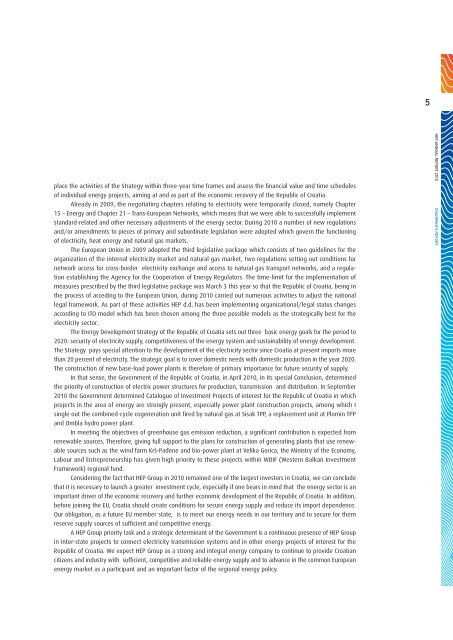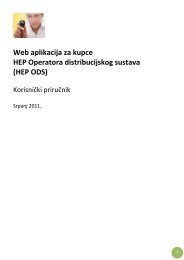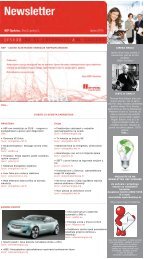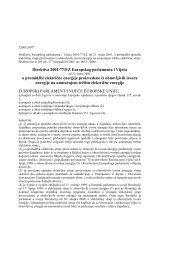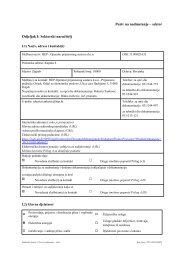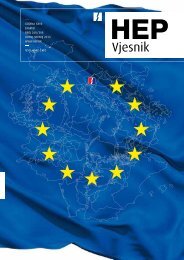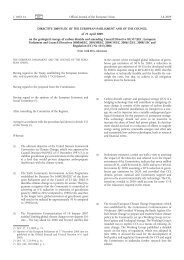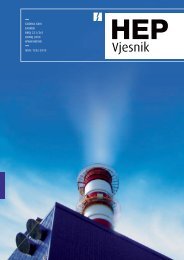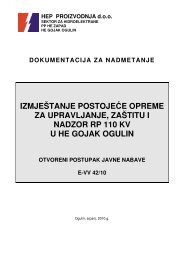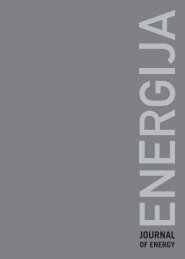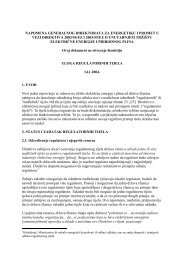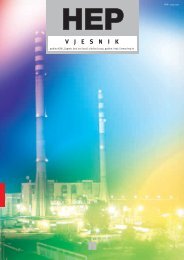DRAVA, KUPA, RJE»INA, LOKVARKA, LI»ANKA LIKA, DOBRA ...
DRAVA, KUPA, RJE»INA, LOKVARKA, LI»ANKA LIKA, DOBRA ...
DRAVA, KUPA, RJE»INA, LOKVARKA, LI»ANKA LIKA, DOBRA ...
You also want an ePaper? Increase the reach of your titles
YUMPU automatically turns print PDFs into web optimized ePapers that Google loves.
place the activities of the Strategy within three-year time frames and assess the financial value and time schedules<br />
of individual energy projects, aiming at and as part of the economic recovery of the Republic of Croatia.<br />
Already in 2009, the negotiating chapters relating to electricity were temporarily closed, namely Chapter<br />
15 – Energy and Chapter 21 – Trans-European Networks, which means that we were able to successfully implement<br />
standard-related and other necessary adjustments of the energy sector. During 2010 a number of new regulations<br />
and/or amendments to pieces of primary and subordinate legislation were adopted which govern the functioning<br />
of electricity, heat energy and natural gas markets.<br />
The European Union in 2009 adopted the third legislative package which consists of two guidelines for the<br />
organization of the internal electricity market and natural gas market, two regulations setting out conditions for<br />
network access for cross-border electricity exchange and access to natural gas transport networks, and a regulation<br />
establishing the Agency for the Cooperation of Energy Regulators. The time-limit for the implementation of<br />
measures prescribed by the third legislative package was March 3 this year so that the Republic of Croatia, being in<br />
the process of acceding to the European Union, during 2010 carried out numerous activities to adjust the national<br />
legal framework. As part of these activities HEP d.d. has been implementing organizational/legal status changes<br />
according to ITO model which has been chosen among the three possible models as the strategically best for the<br />
electricity sector.<br />
The Energy Development Strategy of the Republic of Croatia sets out three basic energy goals for the period to<br />
2020: security of electricity supply, competitiveness of the energy system and sustainability of energy development.<br />
The Strategy pays special attention to the development of the electricity sector since Croatia at present imports more<br />
than 20 percent of electricity. The strategic goal is to cover domestic needs with domestic production in the year 2020.<br />
The construction of new base-load power plants is therefore of primary importance for future security of supply.<br />
In that sense, the Government of the Republic of Croatia, in April 2010, in its special Conclusion, determined<br />
the priority of construction of electric power structures for production, transmission and distribution. In September<br />
2010 the Government determined Catalogue of Investment Projects of interest for the Republic of Croatia in which<br />
projects in the area of energy are strongly present, especially power plant construction projects, among which I<br />
single out the combined-cycle cogeneration unit fired by natural gas at Sisak TPP, a replacement unit at Plomin TPP<br />
and Ombla hydro power plant.<br />
In meeting the objectives of greenhouse gas emission reduction, a significant contribution is expected from<br />
renewable sources. Therefore, giving full support to the plans for construction of generating plants that use renewable<br />
sources such as the wind farm Krš-Pađene and bio-power plant at Velika Gorica, the Ministry of the Economy,<br />
Labour and Entrepreneurship has given high priority to these projects within WBIF (Western Balkan Investment<br />
Framework) regional fund.<br />
Considering the fact that HEP Group in 2010 remained one of the largest investors in Croatia, we can conclude<br />
that it is necessary to launch a greater investment cycle, especially if one bears in mind that the energy sector is an<br />
important driver of the economic recovery and further economic development of the Republic of Croatia. In addition,<br />
before joining the EU, Croatia should create conditions for secure energy supply and reduce its import dependence.<br />
Our obligation, as a future EU member state, is to meet our energy needs in our territory and to secure for them<br />
reserve supply sources of sufficient and competitive energy.<br />
A HEP Group priority task and a strategic determinant of the Government is a continuous presence of HEP Group<br />
in inter-state projects to connect electricity transmission systems and in other energy projects of interest for the<br />
Republic of Croatia. We expect HEP Group as a strong and integral energy company to continue to provide Croatian<br />
citizens and industry with sufficient, competitive and reliable energy supply and to advance in the common European<br />
energy market as a participant and an important factor of the regional energy policy.<br />
5<br />
HEP ANNUAL REPORT 2010 CHAIRMAN’S REPORT


